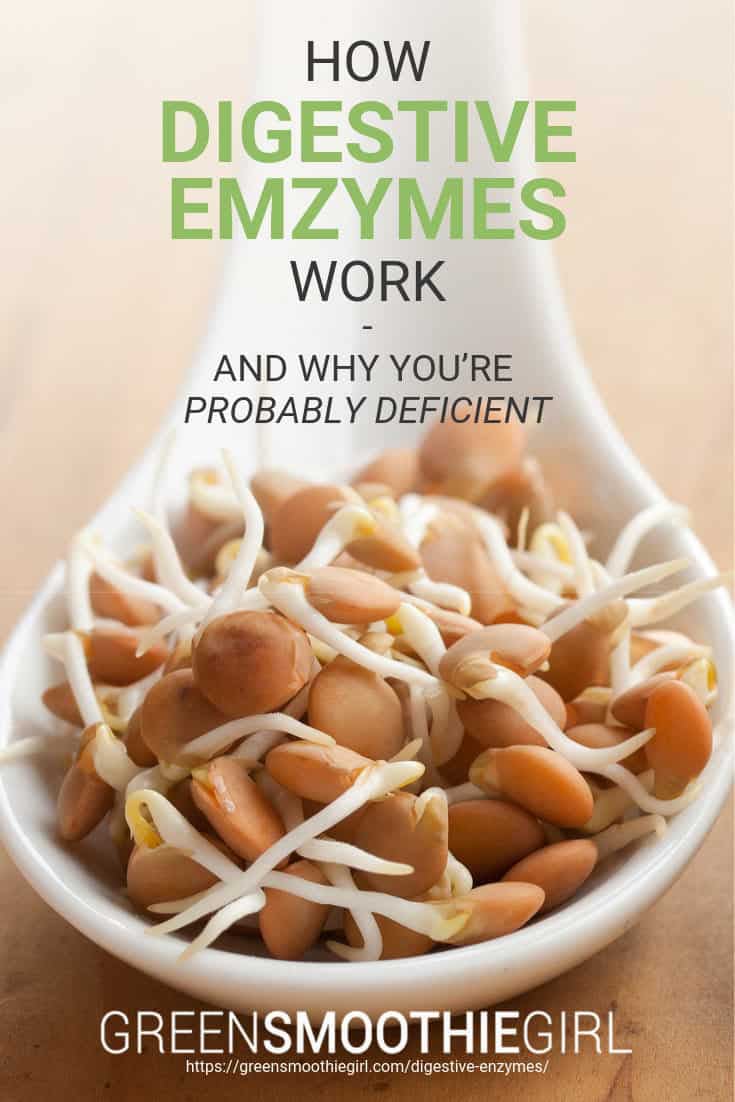How Digestive Enzymes Work–And Why You’re Probably Deficient

Enzymes have everything to do with your health. Simply put, enzymes make things happen.
In this post:
- What Is an Enzyme?
- How Digestive Enzymes Work — And Why They’re So Important
- What You Should Know About Enzyme Deficiency
- The Answer to Enzyme Depletion: A Raw Food-Dense Diet
- Frequently Asked Questions About Enzymes
- What About Elevated Liver Enzymes?
- Conclusions About Digestive Enzymes
These proteins are the gatekeepers of numerous chemical reactions in your body1--every second of every hour of every day. Enzymes break down your food, build your muscles, repair or kill damaged cells, and annihilate toxins.
They do all of those things, when they can. We all know that it’s possible to be deficient in micronutrients like Vitamin A or D. But did you know that most of us are severely deficient in enzymes2?
Let’s dig into how enzymes work, why Western societies like ours, in particular, are deficient in enzymes, and why all of it matters so much to your health.
What Is an Enzyme?
Enzymes are a special type of protein that controls when and how chemical processes like digestion happen in your body, right down to the cellular level. They work with the bacteria in your gut and the nutrients and minerals you consume.
Some enzymes break molecules down into usable components for digestion and muscle synthesis. Other enzymes build complex molecule structures that regulate cell repair, cell growth, and toxin cleanup.
There are three basic kinds of enzymes that work together in the human body. Digestive enzymes, metabolic enzymes, and food enzymes. And while we’re honing in on digestive enzymes today, understanding how all three groups work together can be really helpful.
Digestive Enzymes
Digestive enzymes break the food you eat down into usable molecules for energy production and cell function. These enzymes also play an important role in metabolic processes. Digestive enzymes can be produced by the body or found in raw foods or supplements.
The digestive enzymes found in raw foods or supplements are called exogenous enzymes.
They’re especially important because your endogenous enzymes (the ones your liver and pancreas make) are meant to be reserved for higher metabolic processes2 like shuttling nutrients into cells and removing waste buildup, rather than wasted by breaking down food that was meant to come with its own enzymes.
The following are three of the most critical digestive enzymes:
Lipase: This protein is produced by the liver and pancreas. It’s also found in avocados, legumes, and nuts. Lipase breaks down oils and fats (lipids) into fatty acids that your body and brain can then use for energy.
Amylase: This protein is produced in the salivary glands, the liver, and the pancreas. It’s also found in carbohydrate-dense fruits like apples and bananas, and starchy foods like potatoes. Amylase breaks down carbohydrates and starches, converting them into glucose (sugar) that your body and brain can use for energy.
Protease: This metabolic enzyme is produced in the pancreas, stomach, and small intestine. Protease can also be found in pineapple, papaya, and whole grains like quinoa. This enzyme breaks down protein, converting it into amino acids that can be used to build muscle, repair cellular damage, and remove waste and toxins from cells.
Metabolic Enzymes and Food Enzymes
In addition to digestive enzymes, your body also relies on metabolic enzymes and food enzymes.
Metabolic enzymes keep the cells in your blood, organs, and tissues healthy by regulating growth and repair, as well as flushing dead and harmful material from the cells.
Food enzymes, as the name implies, are found in raw foods. Many of them are identical to the digestive enzymes your own body produces, like lipase, amylase, and protease. Others are only found in raw foods, like cellulase, which breaks down fiber.
Enzymes are a little bit like puzzle pieces. Their shape is incredibly important to their proper function. Why does that matter? Because it’s not very difficult to alter an enzyme’s shape and render it totally useless.
Genetic modification, heat from cooking, processing, chemicals like Roundup, and disease all change the shape of enzymes.3
And if you’re thinking, “I’m pretty sure most of my food is genetically modified, cooked, processed, or treated with chemicals,” you’re on the right track. Most of us in the Western world are severely deficient in enzymes.2
How Digestive Enzymes Work — And Why They’re So Important
Without digestive enzymes, your body can’t use the food you eat effectively. And if you’re enzyme deficient, which most of us are (more on that below), you can be eating a whole lot of nutrient-dense food while getting hardly any of the benefits.
Enzymes work hand in hand with the bacteria in your gut4 to break down food into usable nutrients, deliver those nutrients to your cells, and manage important chemical processes throughout your entire body.
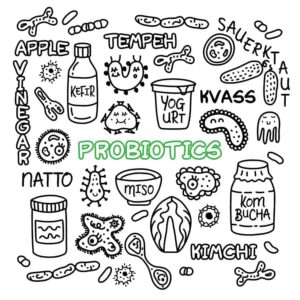
While bacteria on the outside of your body can cause serious infections, the bacteria inside your body can protect against it.
Think about it this way: Nutrients from food don’t just flow directly into our cells and tissues. Without enzymes, that peach you ate for breakfast would sort of just slog around in your gut, becoming food for the bacteria in your microbiome instead of your cells, putting your immune system on high alert and causing gas, bloating, diarrhea, and functional problems for nutrient-starved cells.
The Fate of Undigested Food
So, what becomes of that undigested food floating around in your digestive tract? Some of it is consumed by the bacteria in your gut. And some of those unusable particles can make their way into your bloodstream, triggering your immune system to send antibodies to the rescue (since these foreign bodies are treated as potentially harmful or toxic invaders).
You might have heard this phenomenon called “leaky gut syndrome.”5
Some of these little globs of undigested food are disposed of by your immune system’s “garbage collection system.” But others hang around and grow, mutate, and even attach themselves to body tissues, triggering an even bigger immune response and inflammation.
Over time, the inflammation and cell damage from poor digestion and nutrient absorption can lead to diseases5 like fibromyalgia, reproductive problems, autoimmune conditions like Hashimoto’s, diabetes, and even cancer.6
What You Should Know About Enzyme Deficiency
Our ancestors got plenty of enzymes. So do indigenous peoples around the world who eat close to the land and consume plenty of raw, unaltered foods. So do animals in the wild who, uncoincidentally, don’t suffer from nearly the variety of diseases we humans do.
Ironically, the legacy of affluence and so-called progress is that most of us now eat cooked, processed, refined, chemically altered, dead foods as the bulk of every meal and snack.
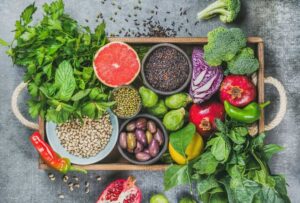
The fresher the food, the better the enzymes.
Where Have All the Enzymes Gone?
Much of the food we eat used to be rich in enzymes but has been cooked or processed or chemically altered, which effectively destroys those enzymes.
Unsurprisingly, societies that are largely free of heart disease, arthritis, diabetes, autoimmune diseases, and cancer7 are the same societies that don’t cook most of their food and don’t mass-produce their food with a lot of chemicals.
Can’t I Just Produce My Own Enzymes?
But can’t the human body produce its own enzymes, you might think?
And you’re right. The human body can (and does) produce key digestive enzymes, primarily in the pancreas and liver.
In fact, most of our bodies are in hyperdrive from the time we are weaned as babies, trying to produce enough enzymes to break down the enzyme-devoid foods we eat.
Unfortunately, the body has a finite capacity to produce those digestive enzymes. Most experts estimate that in modern times (and most industrialized nations) our bodies have about 30 years’ worth of ability to produce enzymes effectively.2
That’s enzymatic potential that cannot be replaced. When our enzymes are depleted, we begin to die, in dozens of insidious, slow ways. Cells and organs begin to slow down and malfunction.
Other Causes of Low Enzyme Production
Aging and cooked foods aren’t the only reasons we may have poor enzymatic function. Because digestive chemistry works in a particular order, any disruption or suboptimal function during each of the steps can result in fewer available enzymes.
First, stomach acid is produced at a pH of 1-2. If the stomach acid is optimal, that triggers the release of bile. If the bile production (which is dependent on choline) is optimal, a signal is transmitted to the pancreas to produce and release digestive enzymes.
If any of the triggers or regulators for stomach acid or bile production are deficient, the resulting enzyme production will also be deficient. Common disruptors include poor thyroid health, and a lack of essential nutrients like choline and minerals.
The Toll of Enzyme Depletion
Since enzymes must be present to digest—and use—any food you eat, the body shoulders a heavy burden each time you eat food that is devoid of enzymes (cooked or denatured foods).
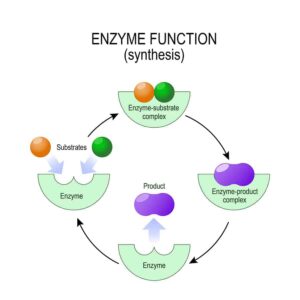
Enzymes are the reason that your food gets digested properly.
Most of us are guilty of forcing our bodies to use this limited resources for enzyme production almost constantly. And it’s a truly fatal mistake.
You see, your body is very resourceful. If you persist in eating food that doesn’t come with its own enzymes for digestion, your body will burn out its own capacity for enzyme production. And then, when the pancreas, liver, and salivary glands cannot supply enough, your body will begin to rob enzymes from other organs, and from other critical metabolic processes.2
Just like people with alcoholism have enlarged livers because of the heavy burden placed on this organ, the pancreas becomes enlarged when a body is fed lots of enzyme-free (cooked or processed) food.
Lab mice eating a cooked, enzyme-free food have a pancreas two to three times heavier than wild mice eating a raw-food, enzyme-rich diet.2
Effects of Enzyme Deficiency
Early effects of enzyme depletion include indigestion, heartburn, constipation, gas, and bloating as your digestive system struggles to extract the nutrients and minerals from the food you eat.
And as particles of undigested food enter your bloodstream, triggering that immune response and inflammation, autoimmune and inflammatory conditions like fibromyalgia, psoriatic arthritis, ulcerative colitis, and Crohn’s disease, can develop.
The long-term effects are increasing early aging, all the degenerative diseases (cancer, heart disease, and many more) resulting from cellular damage, the buildup of wastes and toxins, and burnout of our organs.
And the end result is early death.2 It all starts with enzyme depletion.
But it’s entirely preventable.
The Answer to Enzyme Depletion: A Raw Food-Dense Diet
If we eat live, raw food, the food itself provides the enzymes needed for complete digestion and breakdown of nutrients.
Live food—raw, not heated above 116° Fahrenheit—contains the enzymes we need to digest it properly. And if you’re wondering which raw foods you should be eating, you only have to look as far as the types of enzymes your body creates naturally.
Research shows that different kinds of animals produce enzymes based on their ideal diet.8 Meat eaters (like big cats) naturally produce higher amounts of protease, to break down protein. Animals like whales don’t produce any amylase, because they don’t eat any carbohydrates.
The proportion of the enzymes we produce as humans (combined with our long and winding digestive tracts) indicates that we should be eating a primarily plant-based diet of fruits and vegetables. Amylase production in the human liver, pancreas, and especially the saliva glands9 is higher than even primates, who eat a plant diet.
Why Plant-Derived Enzymes Are Ideal for Digestion
First of all, plant-derived enzymes are easy to consume in a raw, unaltered format. Meat, eggs, and fish usually need to be cooked (which destroys harmful bacteria like e-coli, but also destroys enzymes.) Even dairy products like yogurt, milk, and butter are typically pasteurized or heat-treated, which kills those enzymes as well.
Another reason plant-based enzymes are so crucial is pH, or the acid-alkaline balance. Plant-based enzymes are most effective between 3 and 9.10 Funny enough, that’s absolutely ideal for the pH of the human digestive tract.
Foods with High Enzyme Content
Foods with the highest enzyme content include sprouted seeds, nuts, and grains.
A nut, seed, or grain that is soaked for a few hours explodes with enzyme potential when it germinates and becomes a live food. Sprouted food has exponentially greater nutrition than unsprouted food.11
Second only to sprouts in enzyme content are greens like kale, spinach, and chard. Fruits that are especially rich in enzymes include pineapple, papaya, avocados, bananas, cantaloupe, and kiwis.
Cultured foods like kefir, raw sauerkraut, kimchi, and pickled vegetables can also be powerful sources of enzymes.
What About Enzyme Supplements?
Like you, I’m sure, I like to travel and go to parties, barbecues, or restaurants with friends or family now and then. If I can, I always get a big green salad or plate of fruits and vegetables before eating anything cooked.
I also like to drink a fresh green juice or green smoothie before I go to a party. Then, I’m not overly hungry, and I’m supplying enzymes before eating cooked food I wouldn’t normally eat at home.
Still, there are times when it simply isn’t possible to get a big plate of greens with a meal.
That’s why I always keep a supplement in my purse that’s an all-in-one with prebiotics, probiotics, and digestive enzymes. On days when you aren’t able to eat 60-80% raw, these supplements can be a literal lifesaver. I remind myself that I have 30 years of endogenous enzyme production and I probably used most of that up, in my first few decades of life, as a junk-food addict!
Related: How to Test Your Probiotic Supplement
And even on the days when you can eat mostly raw, organic plant foods, you’re smart to take a supplement for enzymes and coenzymes, as well as probiotic and prebiotic benefits.
The Importance of Coenzymes, Probiotics, and Prebiotics
Enzymes work hand in hand with the bacteria inside your gut. A vibrant, healthy community of gut bacteria protects us from disease, keeps inflammation at bay, regulates hormone production, breaks down food, and converts the food we eat into short-chain fatty acids.
Prebiotics are the particular kind of fuel those gut bacteria need to do their job correctly and produce those vital fatty acids. Not coincidentally, prebiotic fiber is also found in some of the most enzyme-rich foods, like leafy greens, grains, and fermented foods.
To work properly, enzymes also need nutrients and minerals to act as coenzymes, or cofactor triggers. Think of coenzymes as the copilots in the chemical reactions, cell repair, and digestive processes that enzymes perform. Nutrients and minerals are the raw materials enzymes can use to function properly and trigger chemical processes.
Frequently Asked Questions About Enzymes
I’ve been talking about enzymes and enzyme deficiency for many years. And the following are the most common questions that people have when it comes to enzymes and digestive health:
Can Enzyme Supplements Survive Stomach Acid?
Short answer: Yes.
Longer answer: It makes sense why this question comes up again and again. The stomach’s low pH does stop some salivary, food, and supplemental enzymes from working temporarily. These same enzymes are reactivated in the alkaline duodenum and lower intestine.
One study showed that 51 percent of amylase from malted barley was still intact by the time it moved into the intestine!
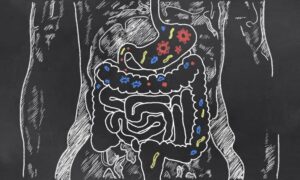
The stomach serves as a first line of defense for your immune system. It contains hydrochloric acid, which helps to kill off bacteria and viruses that may enter with the food you eat.
What About Enzymes in Raw Meat and Dairy?
As I mentioned earlier, a lot of dairy products are so processed, pasteurized, and heat-treated that many of the enzymes are totally useless.
Raw milk, on the other hand, has over 35 enzymes. However, it can be difficult to find and may still be a risk for harmful bacteria. (Raw goat milk is preferable to cow milk, with its smaller fat molecule that is not mucus-forming like cow milk is.)
Raw meat is also enzyme-rich, but troublesome. I would not recommend eating it, even if you go to all the trouble of finding truly range-fed, organic chickens or beef.
Overall, plants are simply the best and easiest choice for everyday enzyme consumption.
How Do Enzymes Work with Nutrients?
You may have seen scary articles insisting that some foods contain “anti-nutrients.” Like phytates. And on its face, that does seem really scary. However, I’m going to tell you right now: they’re still good foods.
Virtually every whole plant food proven to decrease disease risk has “anti-nutrients.” And more experts are now coming to the conclusion that they may be friends, not foes, even if they can trigger inflammatory responses in some immune-compromised individuals (with gut problems).
What’s the missing piece of the puzzle? Enzymes.
They break down those “anti-nutrients,” then use all the amazing nutrients as co-factor triggers, or co-enzymes, to trigger the metabolic processes you need to stay well and healthy.
What About Elevated Liver Enzymes?
Certain diseases (Celiac disease and hepatitis, to name a couple) as well as high alcohol use and other types of liver damage can cause the liver to leak precious stores of enzymes into the bloodstream.
In these cases, a blood test will reveal high liver enzymes. But by that time, symptoms of jaundice, nausea, bruising and swelling, fatigue, and shortness of breath will already be telling you that something is very wrong.
In addition to treating the underlying condition that may be causing your elevated liver enzymes, you can also help lower your elevated liver enzymes by doubling your efforts to eat enzyme-rich, raw foods (so that your liver won’t be taxed in trying to produce them to digest your food), and avoid processed, dead foods that burden your compromised liver.
Conclusions About Digestive Enzymes
We all know that it’s important to eat a diet rich in vitamins and minerals. But the key to actually using those precious micronutrients lies in our enzymes.
And just like deficiencies in key micronutrients can lead to disease and dysfunction, a deficiency in key digestive enzymes like protease, amylase, and lipase can cause waste buildup in our cells, leaky gut syndrome, autoimmune conditions, and even cancer.
The standard Western diet of processed, cooked food for every meal means that most of us are severely deficient in enzymes. Adding more raw, uncooked fruits and vegetables to your diet, and supporting your body’s overtaxed enzyme production system with enzyme supplements can make a significant difference to your health.
Pro tip: keep an all-in-one Enzyme, Prebiotic, and Probiotic supplement handy, for any meal you eat that isn’t 60-80 percent raw plant foods.
Read Next: Do You Really Need Prebiotics?

Disclosure: This post may contain affiliate links that help support the GSG mission without costing you extra. I recommend only companies and products that I use myself.
Resources
- Cooper GM. The Cell: A Molecular Approach. 2nd edition. Sunderland (MA): Sinauer Associates; 2000. The Central Role of Enzymes as Biological Catalysts.
- Howell, Edward. Food Enzymes for Health and Longevity, Revised and Enlarged. Lotus Press, 2015.
- Roland, James; Biggers, Alana. “Why Are Enzymes Important?” Healthline. 2018.
- Quinten, T., Philippart, J., Beer, T. D., Vervarcke, S., & Driessche, M. V. (2014). Can the supplementation of a digestive enzyme complex offer a solution for common digestive problems? Archives of Public Health, 72(Suppl 1).
- Mu Q, Kirby J, Reilly CM, Luo XM. Leaky Gut As a Danger Signal for Autoimmune Diseases. Frontiers in Immunology. 2017;8:598. doi:10.3389/fimmu.2017.00598.
- Thomas Jefferson University. "Stronger intestinal barrier may prevent cancer in the rest of the body, new study suggests." ScienceDaily. ScienceDaily, 21 February 2012.
- Dana Farber Cancer Institute. “Which Countries Have the Highest and Lowest Cancer Rates?” Published: June 27, 2014. Updated: October 28, 2015.
- Wang Z, Xu S, Du K, et al. Evolution of Digestive Enzymes and RNASE1 Provides Insights into Dietary Switch of Cetaceans. Molecular Biology and Evolution. 2016;33(12):3144-3157. doi:10.1093/molbev/msw191.
- Gibbons, Ann. How Modern Humans Ate Their Way to World Dominance. Science Feb. 6, 2015. Retrieved Aug. 8, 2015
- Ianiro G, Pecere S, Giorgio V, Gasbarrini A, Cammarota G. Digestive Enzyme Supplementation in Gastrointestinal Diseases. Current Drug Metabolism. 2016;17(2):187-193. doi:10.2174/138920021702160114150137.
- J. K. Chavan, S. S. Kadam. Nutritional improvement of cereals by sprouting. Crit Rev Food Sci Nutr. 1989; 28(5): 401–437. doi: 10.1080/10408398909527508
This post has been reviewed for accuracy by Dr. Tim Jackson, DPT and functional medicine practitioner.
Posted in: 12 Steps To Whole Food, Immunity, Supplements, Whole Food



